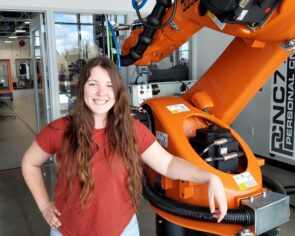Mechatronics: Unique degree, multiple applications
by Jean Borst
The field of mechatronics blends mechanical engineering, electrical engineering and computer science to design, build and operate smart machines. From the autofocus on your cell phone to the anti-lock brakes on your car, mechatronics systems form the backbone of every computer-controlled machine and sophisticated consumer product.
A Direct Path to Careers
While typically a segment of a traditional engineering degree, CPTC offers a direct path to careers in this emerging field. In fact, the college kind of has the market cornered. The BAS Mechatronics Engineering Technology and Automation (BAS-META) degree is the only four-year mechatronics program offered in the Pacific Northwest, the only 2+2 (associate + bachelor’s degree) mechatronics degree in the U.S., and one of only 10 mechatronics BAS programs in the country.
“The COVID-19 pandemic has created supply chain disruptions and the need to rework production environments. It’s led to explosive growth in the industry. There will be a be very high need for the skills we teach.”
Jason Sawatzki, co-founder of the BAS-META program
“The BAS builds on technical skills offered in the Mechatronics Associate in Applied Science degree program, with additional emphasis on the engineering piece of the field that industry partners are looking for,” said Jason Sawatzki, CPTC instructor and co-founder of the BAS-Mechatronics program. That includes hands-on work with wireless communications systems, robotic integrators, distributed networking systems, simulation technologies, artificial intelligence, data analytics and more.
“Automation is happening in every industry, so this degree really is for anyone,” said Carl Wenngren, instructor and co-founder of the BAS-META program. “Students can leverage any prior experience, add mechatronics skills on top and take their career to another level.”
In other words, it’s not just about nerding out with machinery. Mechatronics can be applied to a wide range of industries and specialties beyond manufacturing, from clean drinking water systems and solar panels, to farm irrigation and retail. The list goes on.
Kaitlyn Pype, BAS-META student

Bachelor of Applied Science in Mechatronics Engineering Technology and Automation student Kaitlyn Pype
After completing her AAS in Mechatronics at CPTC, Kaitlin Pype jumped at the chance to continue her studies. “The BAS program is really expanding our horizons, from individual topics such as mechanical systems and electricity, to whole systems and what ties them all together, to workflows on moving raw material into sellable product,” she said. “ Seeing the bigger picture and knowing how to connect the dots with our own projects is very rewarding.”
As project coordinator for a company that produces industrial control panels, Pype has been able to apply multiple skills she’s learned in the program in her job. Advanced study of automation and other elements of mechatronics will only broaden her horizons and career path. “A bachelor’s degree will take me even further in the manufacturing industry,” Pype said.
Summer Bridge: bring your degree
While an AAS-Mechatronics degree offers a seamless transition, it isn’t the sole pathway to the BAS program. For individuals interested in mechatronics who have an associate degree in another field, CPTC offers a simple solution. Beginning this summer, “bridge” program will be offered to help prepare students to enter the BAS-META program fall quarter.
“Automation is happening in every industry, so this degree really is for anyone. Students can leverage any prior experience, add mechatronics skills on top and take their career to another level.”
Carl Wenngren, co-founder of the BAS-META program
In light of the events of 2020, there’s never been a better time to get into the mechatronics industry. “The COVID-19 pandemic has created supply chain disruptions and the need to rework production environments,” Sawatzki said. “It’s led to explosive growth in the industry. There will be a be very high need for the skills we teach.”
Learn more about CPTC’s bachelor’s degree programs, including potential careers, time requirements and information sessions, at cptc.edu/programs/bas.